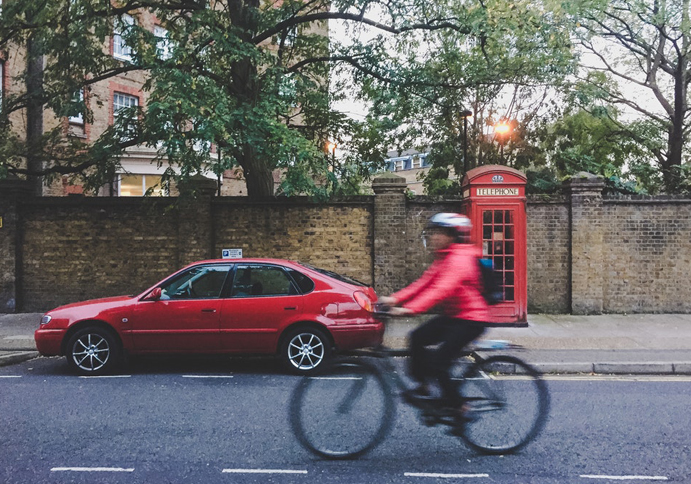With Britain facing an obesity crisis and physical inactivity contributing to almost one in 10 premature deaths in England, encouraging more people to take up active travel has never been more important.
Useful Projects have long been advocating the benefits of cycling in urban design and how it can help improve people’s health and wellbeing. In this blog, our intern Lana Harding writes about the benefits of getting on a bike and shares some advice on how to overcome any negative perceptions of cycling.
1. Improves health and fitness
Exercise significantly improves your physical and mental health, reducing the risk of obesity and heart disease and increasing life expectancy (NHS, 2011). Cycling to work reduces the risk of developing cancer by 45% and cardiovascular disease by 46% (Cycling UK, 2017).
2. Improves mental health and wellbeing
Cycling and being outside makes you feel better, reducing stress and anxiety (Cycling UK, 2018). An active lifetime can improve wellbeing by 32% (YMCA, 2016).
3. Social
Joining a cycling group or club, or just going for a friendly bike ride, is a great way to meet and get to know others. There are over 1000 cycling clubs across the UK, catering to different abilities and interests.
4. Saves you money
Bicycles are considerably cheaper than cars and maintenance costs are low compared to with car fuel or paying for public transport. Over a year, spending £400 on a bike and cycling every day, instead of £8 each day for transport, would save you £1686 (Morgan, 2018). Compared to joining a gym, this form of exercise is free for bike owners!
5. Saves the state money
Improving health and wellbeing reduces healthcare costs. Danish levels of cycling would save the NHS £17 billion within 20 years (Rachel Aldred).
6. Saves your business money
Improved physical and mental health of employees increases productivity. On average, cycle commuting employees take one less sick day each year than non-cyclists (Cycling UK, 2016).
7. Clearer, cleaner streets
Cycling saves a third of road space compared to cars (Rachel Aldred). There is no associated noise or air pollution, improving air quality and making roads more pleasant. Shifting 10% of journeys in the UK from car to bike would reduce air pollution and save 400 productive life years (Rachel Aldred).
8. Predictable journey times
On a bike you are in control of your own route, are less affected by traffic (TFL, 2009), and require less parking space compared to driving, making it extremely efficient for short journeys.
9. Equality of opportunity
Cycling increases independence for those unable to drive due to age or financial barriers and in areas where public transport is unreliable, expensive or absent. There is a growing development of mobility cycle vehicles, increasing access for those with disabilities.
10. Helps to boost the UK economy
In addition to direct growth of the cycling sector, it makes towns more desirable and accessible to visit, boosting local economies. Increasing cycling in the UK from 2% to 10% would bring annual benefits of £42bn in 2050 (Cycling UK, 2016).
Negative perceptions of cycling and how to overcome these
There are several reasons that come up again and again when looking at what puts people off cycling. Here are some of the ones we come across most frequently, and some strategies for dealing with them…
It’s dangerous
The risk of an accident when cycling, especially involving motor vehicles, is off-putting. In fact, driving poses more of a risk than cycling; hence, reducing the number of drivers also reduces the danger. Increasing cycling competence, awareness of all road users, and encouraging safety wear makes roads safer for everyone. Provision of good quality cycle paths and routes further increases safety. The National Cycle Network is a series of traffic-free paths and quiet, on-road cycling and walking routes, that connect to every major town and city.
Bad weather
There is a perception that it always rains in the UK. Actually, on a half hour return commute, you only have a 6.4% chance of getting wet throughout the year. All-weather cycling is also an excuse to purchase a shiny new raincoat…
It’s expensive
Cycling costs as much as you want it to. Not all bikes are expensive, especially compared to buying a car. There are also no fuel costs or tickets required. In comparison, running a car in the UK is estimated to cost around £2,600/year, excluding the initial purchase price. Introduction of subsidies, grants and bike hire/share scheme makes cycling even more affordable.
I’m not sporty enough
You don’t have to be very sporty or active to cycle. The beauty of cycling is that you can go at your own pace, and the use of e-bikes make it even easier! In London, Quietways follow low traffic routes to enable less confident cyclists to travel at a gentler pace.
It makes me sweaty
Provision of showers and changing rooms at destinations means that you can still feel clean after cycling. Also, the use of e-bikes makes cycling much less exhausting and sweaty, particularly if your journey includes going uphill.
No parking facilities
Providing adequate, safe bike parking spaces don’t have to take up much space and makes cycling more accessible.
Find out more
If that’s not enough to make you want to get on your bike, we’re designing a whole city around an integrated bike infrastructure. VeloCity is vision for a new way of living – based on clusters of villages within walking and cycling distance of each other. It was the winner of a competition to find innovative ways to transform the vital Cambridge-Milton Keynes-Oxford Growth Arc. You can find out more about our proposals here.
Bibliography
Cycling UK. (2016). Cycling and the economy.
Cycling UK. (2017). Cycling and Health.
Cycling UK. (2018). Cycling UK’s cycling statistics. Retrieved from https://www.cyclinguk.org/resources/cycling-uk-cycling-statistics#Is%20cycle%20use%20increasing%20in%20Britain?
Morgan, S. (2018). Cycle to work calculator. Retrieved from Cycle to work calculator: http://www.cycletoworkcalculator.com/
NHS. (2011). Benefits of Exercise. Retrieved from NHS: https://www.nhs.uk/live-well/exercise/exercise-health-benefits/
Rachel Aldred. (n.d.). Benefits of Investing in Cycling.
TFL. (2009). Road Network Performance & Research – Cycle journey time reliability.
YMCA. (2016). Eudaimonia: How do humans flourish?




